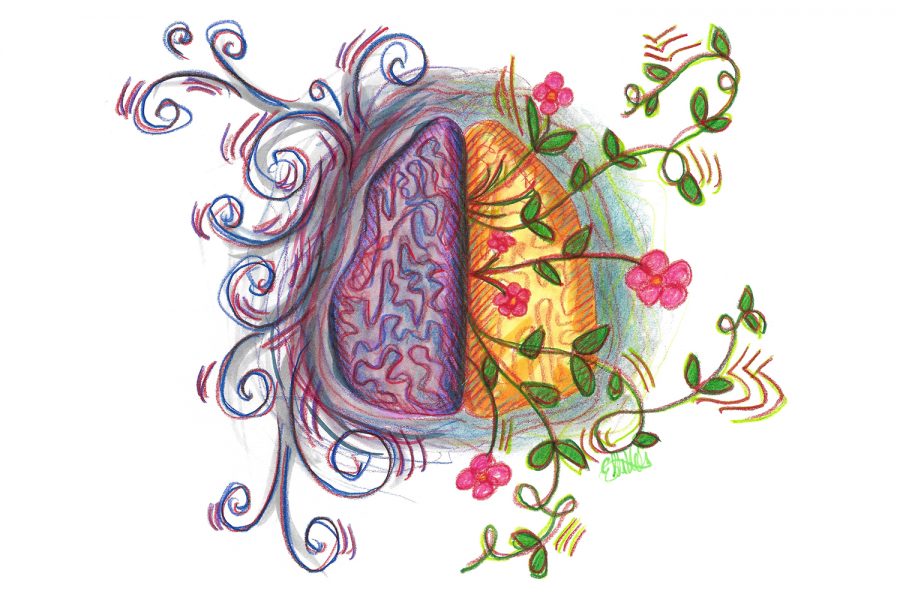The impact of ADHD and stimulants on students
Living with ADHD can be difficult, but with help from others and open communication, the struggle doesn’t seem as hard.
April 27, 2021
May is more than mental health awareness month for me. May marks the one-year anniversary of my Attention Deficit Hyperactivity Disorder (ADHD) diagnosis. At age 15, I was diagnosed with anxiety and depression, which led to a trial-and-error process with a variety of medication combinations. In February 2020, I knew something still wasn’t right. I was diagnosed with ADHD just a few months later.
Since I was diagnosed during the beginning of the COVID-19 pandemic, I did my ADHD testing with a psychiatrist over Zoom. My first meeting was an hour long. We simply talked things through, and he got to know parts of me. The next meeting with the psychiatrist was nearly three hours long and included multiple questionnaires, intellectual screenings, cognitive tests, and distractibility tests.
My diagnosis was difficult for me to fully grasp right away and the idea of telling people I had been diagnosed made my anxiety even worse. Shortly after my diagnosis, my doctor put me on Adderall and began trying out more medication combinations.
I kept my diagnosis and treatment a secret from most of my extended family, friends, and peers for a long time because I wasn’t sure how to explain why I didn’t exhibit many of the well-known symptoms. Growing up, my classmates and teachers told me that I was too sensitive, I was easily distracted, and I needed to stop procrastinating. Teachers told my parents that I was an intelligent student, but I stopped paying attention too often during class. I would get overly emotional during intense, fast-paced situations, which impacted most of my athletic career in high school.
After my diagnosis, I learned that all of these experiences were actually symptoms of ADHD.
Seton Warren, senior at the University of Iowa, also has ADHD and has used stimulants as a treatment for her diagnosis. She shared how ADHD affects her academically, causes her to speak before she thinks in social situations, and influences her timeliness.
“I find it extremely difficult to pay attention,” Warren said. “I think it kind of contributes to my procrastination. I have a lot of trouble meeting deadlines and getting myself to go places.”
Many women struggle to get an ADHD diagnosis from their doctors. According to the Of that number, 38 percent are women and 62 percent are men. Their ADHD diagnosis is typically mistaken for or overshadowed by another mental illness.
According to Children and Adults with Attention-Deficit/Hyperactivity Disorder (CHADD), most of what researchers know about women is based on the clinical experience of mental health professionals who have specialized in treating women.
“It’s really difficult for girls to get diagnosed. I was 16 years old, which was way too old to get that diagnosis,” Warren said. “Whereas my little brother got diagnosed when he was in 4th grade.”
Just like any other mental illness, everyone’s symptoms are not the same. According to an article in Understood, girls and boys tend to show different signs of ADHD which causes boys to get diagnosed at a higher rate. Boys tend to exhibit their symptoms externally, such as impulsivity and outward aggression.
Girls often exhibit their symptoms internally, however, such as through inattentiveness and low self-esteem, which can cause issues with anxiety, depression, and eating disorders. As a result, symptoms that are common with boys are the symptoms that are turned into stereotypes of ADHD symptoms.
“It’s going to be different for everyone; there’s going to be varying levels,” Warren said. “Not every person you know with ADHD is going to be the same as the next. It’s not a choice. A lot of people tend to say ‘Well, why don’t you just get your homework done, why don’t you just clean your room, or just don’t think like that, think like this,’ but that’s just not necessarily possible.”
For many people, a diagnosis is hard to accept, Kyle Votroubek, staff therapist at UI University Counseling Services told The Daily Iowan in an email. Many people may feel like it is their fault and that they are simply not as smart as neurotypical people. Others, who are diagnosed later in life, can feel as though a burden has been lifted off their shoulders.
“Many folks with ADHD internalize their struggles with self-blame and this can have severe impacts on their feelings of self-worth and self-esteem,” Votroubek wrote. “Many folks who are diagnosed with ADHD later in life, for example, after high school, find the diagnosis to be a relief because they finally recognize the problem has not been that they are not good enough but that they have different neural structures than people assumed they have.”
Along with a diagnosis often comes a treatment plan. For me, this was Adderall. Getting my diagnosis was overwhelming, but to add Adderall into the mix was a whole other obstacle. The obstacle was more than simply adjusting to a new prescription, but also preparing for how I was going to be treated by others who knew of my medication use. I knew about the use of Adderall on college campuses and knew what this would mean for me.
Adderall is a mixture of the stimulant drugs amphetamine and dextroamphetamine, a controlled substance, and can lead to many health problems for people who abuse it. Abuse of Adderall can cause a person’s nervous system to strips itself of dopamine receptors due to high levels of dopamine in the brain triggered by Adderall.
After my diagnosis, Adderall was the first prescription I tried. My experience with Adderall has been a good one but getting started wasn’t easy. It took me a few months to adjust to the side effects of the medication and slowly increase my dosage until I felt comfortable. Adderall doesn’t work for everyone, but for myself, it was a relief knowing there was a medicine able to help me in everyday life.
“Adderall abuse is a scary thing. There can be some severe physical/mental consequences for the person who is not prescribed Adderall and takes it without consulting a doctor,” Votroubek said.
College is a difficult adjustment for everyone, but for a student with ADHD, it can be even more challenging. According to a 2014 study by Partnership to End Addiction, nearly one-fifth of college students say they abuse prescription stimulants. The most common stimulant abused is Adderall. Most of the students who abuse stimulants are those without an ADHD diagnosis, or prescription.
Between getting a boost to focus on school, to trying to enhance a night out, the abuse of stimulants on college campuses affects people with ADHD more than many understand. Adderall is a controlled substance and not a medication you can simply refill. Someone with ADHD must call their doctor every month to get a refill sent into a pharmacy.
“I empathize with [students that abuse stimulants] during those stressful times,” Warren said. “I get why you would need that extra push, but obviously they shouldn’t be used without a psychiatrist or a doctor monitoring them.”
As a student with ADHD, other students have asked to buy my medication from me and use it. After numerous times of telling people no and explaining that I cannot simply go pick up more, those same people still ask me to sell my Adderall pills.
“Stimulants are no joke,” said Warren, who has been prescribed stimulants other than Adderall. “They make your body feel like crap. They will put you through the ringer; you’re not going to want to eat, your stomach hurts, and you just feel off.”
There are side effects from medications that never go away. I have had side effects from taking Adderall that haven’t changed since the first dose I took. Personally, the side effects that I run into do not outweigh the benefits that I have from taking Adderall. Some of these side effects I have experienced include dry mouth, decrease in appetite, and headaches.
Examples of common misconceptions surrounding ADHD include that people with ADHD have control over when they can and cannot control their symptoms, people with ADHD are just lazy, and people with ADHD are always hyperactive. Between these misconceptions and stimulant abuse, stigmas around ADHD seem hard to break. ADHD is not a heavily researched or talked about mental illness.
According to the National Institute of Mental Health, the Division of Neuroscience & Basic Behavioral Science was given $756,314 in the President’s Budget for research in fiscal 2021, compared to the nearly $2 million total.
Many people do not fully understand what ADHD is or what symptoms to look for in themselves or their peers. ADHD is not a “one size fits all” illness. Every person diagnosed with ADHD is going to be different and everyone’s treatment plan will be different. As ADHD is talked and learned about more, the more likely doctors and families can get people the resources they need.
“I think people have a very shallow understanding of what ADHD is,” Warren said. “I think if it was talked about more in depth, then a lot more people would be diagnosed, and in turn, there would be a lot less misuse of stimulants.”
Understanding the impact that ADHD has on people and the symptoms it causes people to have would make dealing with it feel less isolating. After my diagnosis, I felt very isolated because I did not personally know any other women my age who had ADHD and it made me feel very alone. It was difficult for me to talk about my diagnosis with my peers who didn’t have ADHD because they would typically respond with a comment about how I couldn’t have ADHD because I wasn’t hyper or didn’t act like another person they knew with ADHD.
“It’s important for us to talk about as a society for many reasons,” Votroubek said. “It’s such a common thing that we should all be aware of it. It can be especially negatively impactful to children if people don’t understand their neurodiversity and assume that their concerns are behavioral issues and the result of bad choices. ”
As of today, I am happy to say that I have reached a spot in my life where I have accepted my diagnosis, and I am ready to embrace it. It took me almost a year to get here, and — as a 20-year-old woman with ADHD — it wasn’t an easy process. I do not know if I will still need to be medicated for ADHD in 20 years, but I have comfort in knowing no matter what happens in the future, my diagnosis will not define me.
Mental health awareness, specifically ADHD awareness, is crucial to breaking down the stigma of people with ADHD as being lazy or unmotivated. As a student, daughter, sister, and friend, I am proud to say I have ADHD and I am learning to live with it every day.














